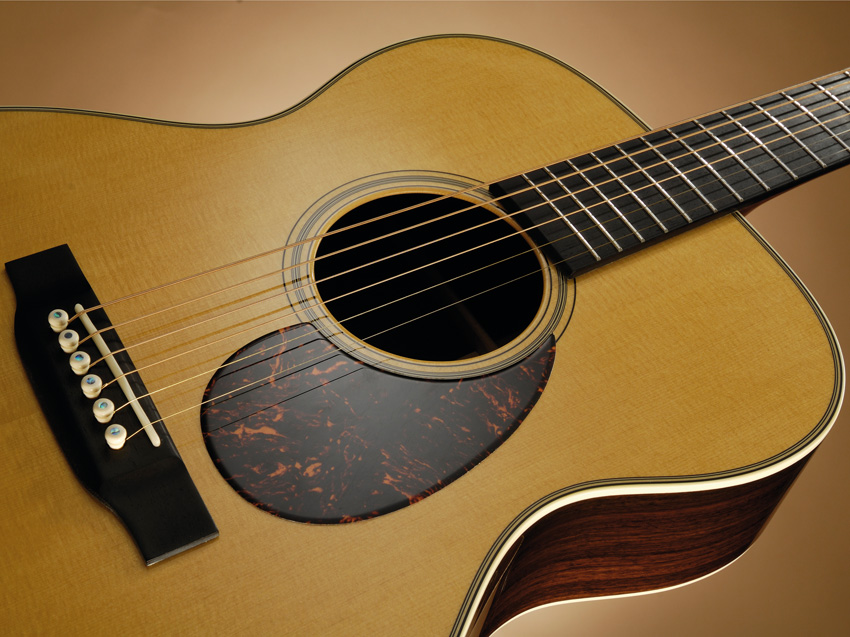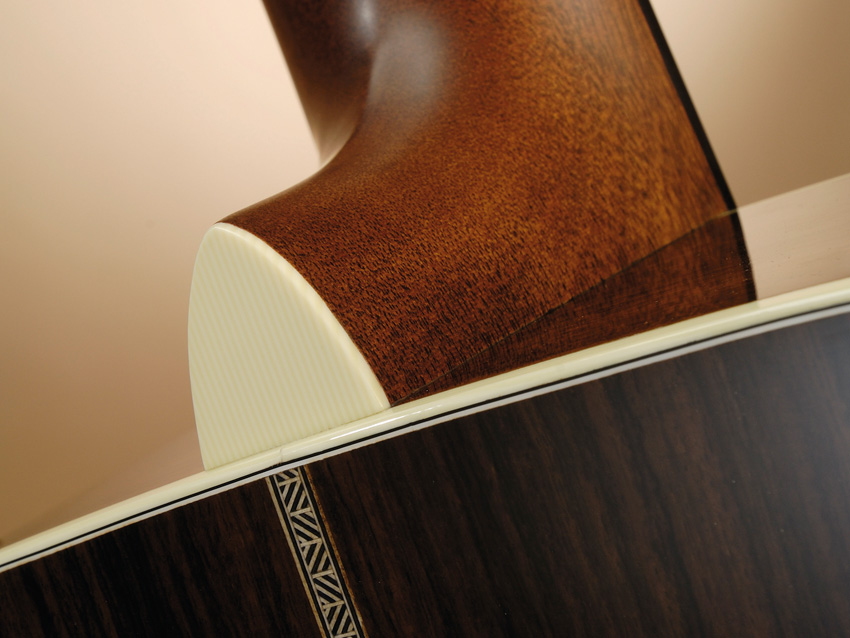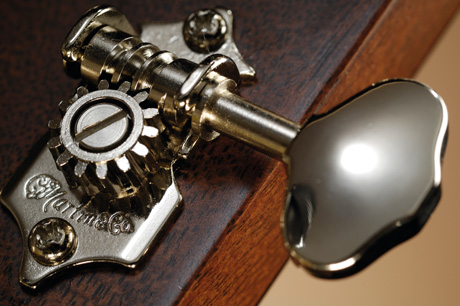MusicRadar Verdict
This stunning piece is tonally versatile, massively rewarding to play and will only get better with time. Clear some space on the credit card…
Pros
- +
Simplicity, clarity and faultless finish.
Cons
- -
Not much, except for the fact that you're not going to get much change out of £3,000.
MusicRadar's got your back

Martin OM Davy Graham

Martin OM Davy Graham
Davy Graham was a legendary figure among the underground clubs in the early sixties, and is widely credited with popularising DADGAD tuning. His avant-garde approach to playing, along with his willingness to experiment, alienated him from the mainstream and propelled him way ahead of his time. His influence on a whole range of guitarists including Paul Simon, John Renbourn, Martin Carthy, Bert Jansch and Jimmy Page simply cannot be overestimated.
In 2007, after a period in the wilderness, the acoustic prodigal son returned home with an album entitled Broken Biscuits. At the same time, Westside Distribution, UK representatives for Martin Guitars, released a special commemorative model to celebrate his career.
The Martin OM Davy Graham is not a remake of an older model. Rather, it is the result of a collaboration between Westside and Graham himself, and constitutes part of the new Artist Series of acoustics to come out of Martin's US Custom Shop.
Many guitarists believe that the OM - a combination of Martin's modified 14-fret 000 body shape, long 645mm scale neck, solid headstock, 46mm nut width, 385mm maximum depth at the end wedge, and 60mm string spread at the bridge - offers the most versatile combination of features available in a steel-string acoustic guitar.
"As you play a chord you can feel every part of the guitar's body come to life and breathe. This OM is a competent strummer but, as you'd expect, fingerstyle is where it excels."
Today many guitar makers, including many small shops and hand-builders, create instruments modelled on the OM pattern.
The first thing that hits you when opening the luxury hardcase, which is supplied as standard, is the wonderful array of tonewood aromas that waft from the guitar. Some say you can tell a lot about an acoustic just by the way it smells.
If you were to loiter around the acoustic section of your local dealer long enough, eventually you'd see someone give a soundhole a quick sniff, because high-end acoustics have an engaging, exotic fragrance that draws you in and demands that you start playing. The Davy Graham OM is no exception.
Want all the hottest music and gear news, reviews, deals, features and more, direct to your inbox? Sign up here.
The DG's dimensions are as per other standard Martin OM models. At its widest the body is 381mm, which makes for a very comfortable playing position. The guitar's length overall is the usual OM length of 995mm, which has proven to result in a perfectly balanced guitar: no nose-diving here.
There are 20 medium sized frets - 14-to-the-body - a bone nut and the customary long scale length. As mentioned, all the ingredients are here for a first-rate fingerstyle acoustic.
What we don't find, however, are any elaborate or fancy mother-of-pearl inlays. The fingerboard markers are slight and delicate. The marquetry to the back is beautifully crafted, yet discreet. The Davy Graham OM possesses a real understated, subtle charm. It's as if she's been caught without make-up on but still looks great.
One noticeable difference between this model and the OM-28V is the neck profile. The 'normal' vintage-series guitar has a modified 'V' profile, which some players have found to be a little too chubby. The Davy Graham OM, however, has a lower, softer profile - much more akin to the Martin Standard Series. It's less polarising than the V neck in terms of general opinion.
A peek inside the soundhole reveals that Martin's high standard of finish is not just skin deep. Everything is finished very well indeed with no nasty traces of glue or wood dust.

On the classic Martin headstock are fitted nickel-plated open-geared butterbean tuners. They're not our favourite, but they certainly perform well. It didn't seem right to leave a Davy Graham model in standard E, so we retuned to DADGAD with ease and no tuning stability problems were found.
Sounds
Hear Guitarist's Simon Bradley put the OM Davy Graham through its paces:
From the very first arpeggio, it is clear that this is an exquisite guitar offering a complex and rich tone. The book-matched Sitka spruce top is incredibly responsive; no doubt aided by the extra resonance on offer from the scalloped 6.4mm spruce bracing fitted beneath.
As you play a chord you can feel every part of the guitar's body come to life and breathe. This OM is a competent strummer but, as you'd expect, fingerstyle is where it excels.
The bass is warm and mellow yet definite and pronounced. This stops you having to really dig in with your thumb for the bass register to stay audible. The mids are resolute and powerful and the treble crystal clear. Sustain is very good too, as is the sound projection.
Martin's factory set-up is excellent, and we found this review model difficult to put down. Worn out and tired pieces from the repertoire of yesteryear are given a new lease of life.
With its interesting conception and collaborative background, it would be easy to class this model as a collectors' piece. But that would be a mistake. The compensated saddle gives evidence that its designers expect this guitar to be able to travel and be gigged, rather than stored as part of a collection.
At £2,799 the Davy Graham OM is not exactly cheap, but it's more affordable than some of Martin's other artist models such as the Andy Summers 000-28 (£4,499) and the Johnny Cash Dreadnought (£3,999). The difference in price is down to the level of embellishment.
The Davy Graham is an example of simplicity and understated elegance; hence the reduced price tag. It's a player's guitar and we'd suggest that if you're looking for a fingerstyle guitar that is beautifully constructed and tonally balanced, the Davy Graham OM is more than worth further investigation.
Steve Harvey is senior content producer for Pro Sound News and also contributes to other Future brands. He has worked in the pro audio industry — as a touring musician as well as in live production, installed sound, and equipment sales and marketing — since November 1980.